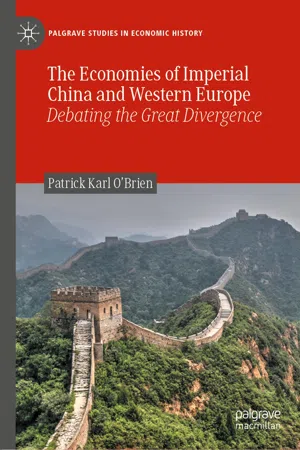The “Great Divergence” is the widely known and short title of a seminal book published at the turn of the millennium by America’s most distinguished historian of late Imperial China. Almost immediately the book by Ken Pomeranz became the focus for an ongoing controversy for global history, economics and politics (Pomeranz 2000; American Historical Review Forum 2002; Journal of Asian Studies 2002, 2003; Ringmar 2007; Canadian Journal of Sociology 2008; Vries 2015).
First, because it reminds us to review historical antecedents for the People’s Republic’s recent and extraordinarily rapid convergence towards levels of economic superiority that the West had supposedly established over China some three or four centuries ago (Grinin and Korotayev 2015). The communist regime’s success in lifting millions of its citizens out of an age-old condition of poverty has been truly outstanding (Eckstein 1968).
On average, real incomes may have multiplied more than 4–5 times since the death of Mao in 1976. Currently, the economy produces around 20% of the world’s output of commodities and services. If present trends continue, the Chinese people could conceivably enjoy American standards of living before the end of this century (Deng 2016).
Secondly, China’s recent and remarkable economic advance which has coincided with a greater rate and intensity of participation of virtually all national economies in the process of globalization has also promoted the revival of a long-standing debate among European, American, Japanese, Indian and Chinese intellectuals concerned to explain when, how and why an enormous gap in levels of material welfare opened up between occidental and oriental societies (Perez and De Sousa 2018). That debate is located in a now fashionable interest in world history, which transcends material welfare to include all aspects of political, social, moral, cultural, as well as economic histories concerned with the rise, decline and qualities of civilizations (Frank 1998; Vries 2013). Apart from current preoccupations with Islam, the Asian civilizations that have attracted, prolonged and serious attention are China, Japan and India (Parthasarathi 2010; Eichengreen et al. 2010; Francks 2016; Vries 2020). The modern debate on economic divergence has, however, remained heavily concentrated upon China, basically because, for several centuries before 1700 Europeans retained a view of Chinese civilization that was almost universally favourable (Phillips 1998; Jones 2013). Thereafter, and as adverse contrasts between the productivity of the empire’s economy, differences in standards of living afflicting its population and the backwardness of its technologies for production and warfare became discernible, then visible and eventually stark, western commentaries on China became dominated by narratives of retardation. These Eurocentric narratives implicitly or explicitly lauded the rise and superiorities of the west and found explanations for the decline of the east by drawing contrasts between the political systems, institutions, legal frameworks and cultures, promoting (and for the Chinese case) obstructing historical trajectories for long-term economic progress (Dawson 1967; Brook and Blue 1999).
Needless to say, such views remained an anathema to Ming and Qing emperors and their mandarin officials. Until the fall of the empire in 1911 and long after a humiliating defeat by Britain in the Opium War 1839–1842, they continued to reject any suggestion that China’s economic institutions and technological knowledge, let alone its political constitution and moral values had anything significant to learn from the west (Wright 1957). For example, and just three decades after the takeover of Bengal by a private multinational corporation—the British East India Company—which was followed by the collapse of the Mughal empire not far away in South Asia—Lord Macartney (who led a failed diplomatic mission to negotiate more flexible terms for commercial relations between the United Kingdom and China) was told in 1800 by the Emperor that “our Celestial Empire possesses all things in prolific abundance and lacks not product within its borders. There is, therefore, no need to import the manufactures of outside barbarians in exchange for our own produce” (Perdue 2005; Berg 2006). Despite occasional expressions of dissent, the official view that China had anything much to learn from an augmented level of commercial intercourse with the west remained powerful even after another ignominious defeat by western powers in a second Opium war (Spence 1999). Retrospectively, the attitude aptly labelled by Mary Wright as “the last stand of Chinese Conservatism”, has been explained, if not justified, by the longevity and success of an enormous and ecologically diverse empire that had been admired by Europeans since the sojourn of Marco Polo in the late thirteenth century (Wright 1957). That view had, moreover, persisted over more or less five hundred years of encounters and contacts between the occident and imperial China under the rule of its Mongol, Ming and Manchu dynasties (Barrow 1806; Dawson 1967).
Over these centuries connexions with Europeans took place, mainly in China and impressions of the empire were communicated to Europe in the form of commercial intelligence from merchants engaged in transcontinental trade with the east, in travelogues published by a tiny number of curious tourists and more elaborately as annual reports from the sixteenth century onwards, written by Christian missionaries, particularly Jesuits, who spent their lives and careers as foreign consultants to the Court in Beijing or, less comfortably, in futile endeavours to convert a mere fraction of the Chinese population to the values and rituals of Roman Catholicism (Mackerras 1989; Mungello 2005).
Europe’s only other vista on Imperial China (again facilitated by ...
